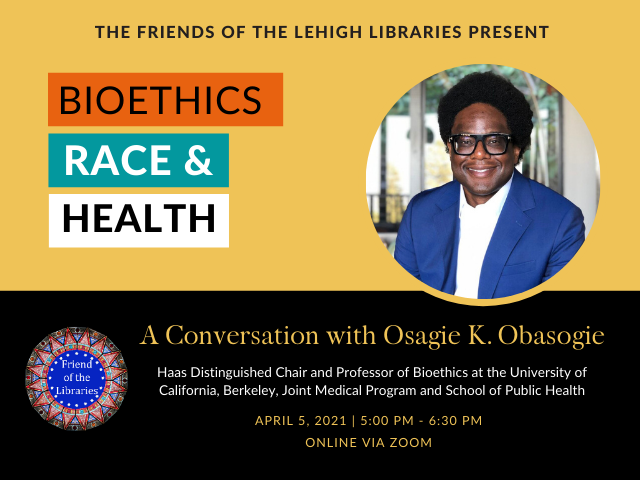A Conversation with Osagie K. Obasogie on Bioethics, Race, and Health
Friends of the Lehigh Libraries speaker series, April 5, 2021, 5:00 p.m. to 6:30 p.m., online via Zoom (view the recording at LTS Talks)
From COVID-19 to recurring acts of police violence, issues of ethics, race, and health shape how we live our lives, how we understand our world, and how we treat one another. Join us for a conversation on these topics with Dr. Osagie K. Obasogie, Haas Distinguished Chair and Professor of Bioethics at the University of California, Berkeley, Joint Medical Program and School of Public Health.
The conversation with Dr. Obasogie will be led by Professor Fathima Wakeel, associate professor and director of graduate programs at Lehigh University’s College of Health.
Following the conversation, a Q&A session will be facilitated by Greg Reihman, Vice Provost for Library and Technology Services.
This event is free and open to the public. Please register in advance. After registering, you will receive a confirmation email containing information about joining the meeting.
About the speakers:
Dr. Osagie K. Obasogie is the Haas Distinguished Chair and Professor of Bioethics at the University of California, Berkeley, in the Joint Medical Program and School of Public Health. Obasogie’s scholarly interests include Constitutional Law, policing and police use of force, sociology of law, bioethics, race and inequality in law and medicine, and reproductive and genetic technologies. His writings have spanned both academic and public audiences, with journal articles in venues such as Cornell Law Review, California Law Review (forthcoming), University of Pennsylvania Law Review (forthcoming), Virginia Law Review (forthcoming), Law & Society Review, Stanford Technology Law Review, and the Journal of Law, Medicine, and Ethics along with commentaries in outlets including the The New York Times, The Washington Post, The Atlantic, Slate, Los Angeles Times, Boston Globe, and New Scientist. His first book, Blinded By Sight: Seeing Race Through the Eyes of the Blind (Stanford University Press) was awarded the Herbert Jacob Book Prize by the Law and Society Association. His second book, Beyond Bioethics: Toward a New Biopolitics (co-edited with Marcy Darnovsky, University of California Press) is an edited volume that examines the past, present, and future of bioethics. His most recent work, Trumpism and its Discontents, is an edited volume that offers critical perspectives on our current political world. Obasogie received his B.A. in Sociology and Political Science (with distinction in both majors) from Yale University, his J.D. from Columbia Law School where he was a Harlan Fiske Stone Scholar, and his Ph.D. in Sociology from the University of California, Berkeley where he was a fellow with the National Science Foundation. [more]
Dr. Fathima Wakeel is an associate professor and director of graduate programs at Lehigh University’s College of Health. She has had twenty years of academic and research training in the Maternal and Child Health field. The goal of Dr. Wakeel’s research agenda is to produce knowledge that will help reduce racial, ethnic, and socioeconomic disparities in adverse maternal and child health outcomes. Though previous work has largely focused on identifying the differential prenatal risks (e.g. maternal stress) underlying these disparities, her research concerns the differential development of protective factors—i.e., personal capital--over the life course. [more]
Dr. Greg Reihman is Vice Provost for Library and Technology Services and Director of the Center for Innovation in Teaching and Learning. In addition to his administrative duties, he researches and teaches topics at the intersection of technology and philosophy. [more]
Sponsored by The Friends of the Lehigh University Libraries.
Please be aware that there has been a nationwide increase in disruptions to virtual events. Some of these disruptive incidents could include offensive language or imagery. If this occurs, the meeting host may need to end the meeting and reschedule. Thank you for your patience as we work through these challenges.
